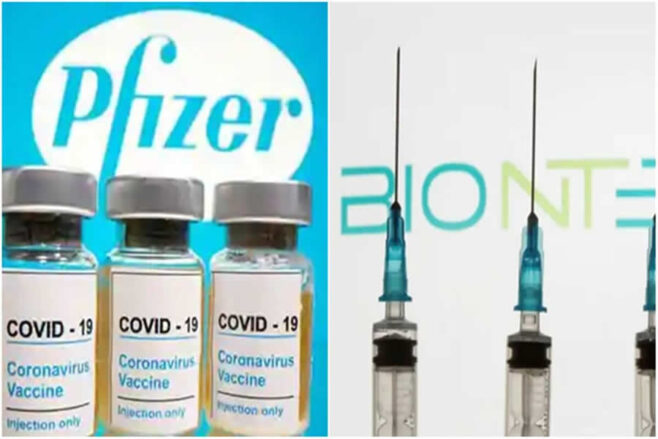Health Canada has approved the Pfizer-BioNTech COVID-19 vaccine for use in Canada.
The first doses against COVID-19 in Canada could be administered by the middle of December.
Meanwhile, doses of the coronavirus vaccine that the Philippines will purchase from Pfizer might arrive between the second and third quarter of 2021.
This was revealed by Philippine vaccine czar Carlito Galvez Jr. on Wednesday (December 9).
Galvez, also the country’s chief implement of the government’s pandemic response, said the Philippines might also be able to procure Chinese vaccines by March 2021 if a contract would be signed this month.
He said the shipment of Covid-19 vaccines developed by Pfizer and other western pharmaceutical firms might be delayed because their countries of origin would be prioritized and “more than 80 percent of vaccine manufacturing capacity has been procured” by first world countries.
The United Kingdom became the first Western nation to begin vaccinating its citizens with Pfizer’s vaccines on December 8.
Even if the Philippines has a good plan on securing Covid-19 vaccines, Galvez said rich nations would still get it first since they were the ones that financed its development.
The Philippines also aims to procure Covid-19 vaccines from Moderna, AstraZeneca, Johnson & Johnson, Novavax, Sinovac and Russia’s Gamaleya.
Galvez said China’s Sinovac might arrive in the country by March if a contract was signed within the month.
The Philippine government plans to inoculate around 24.7 million Filipinos in the first part of the vaccination program.
“Our target for [next] year is more or less 25 million and, based on the availability of vaccines, we can expand it to 30 or 35 million because with this figure, we can contain the death and contamination of our people,” Galvez said.
The Philippines, through the efforts of around 30 private companies, had so far secured at least 2.6 million doses of AstraZeneca vaccine, which has an average efficacy of 70 percent.
In Canada, the approval by the health ministry of the vaccine is a critical moment in Canada’s fight against the novel coronavirus.
The approval comes alongside an update to the timeline for national mass vaccination effort.
Health Canada announced the vaccine approval on Wednesday (December 9).
“Thanks to advances in science and technology, and an unprecedented level of global cooperation, today, Canada reached a critical milestone in its fight against COVID-19 with the authorization of the first COVID-19 vaccine,” the federal agency said in a statement.
Health Canada received Pfizer’s submission on October 9, 2020. After a thorough, independent review of the evidence, Health Canada has determined that the Pfizer-BioNTech vaccine meets the department’s “stringent safety, efficacy and quality requirements for use in Canada”.
“Canadians can feel confident that the review process was rigorous and that we have strong monitoring systems in place,” the agency said.
Health Canada and the Public Health Agency of Canada will “closely monitor the safety of the vaccine once it is on the market and will not hesitate to take action if any safety concerns are identified”.
“The terms and conditions of the Pfizer-BioNTech vaccine authorization require the manufacturer to continue providing information to Health Canada on the safety, efficacy and quality of the vaccine to ensure the benefits of the vaccine continue to be demonstrated through market use.
“The initial indication of the vaccine is for use in people 16 years of age or older. Pfizer-BioNTech are running further clinical trials on children of all age groups and the indication could be revised in the future to include children if the data from these studies support it.
“The vaccine was authorized under Health Canada’s Interim Order Respecting the Importation, Sale and Advertising of Drugs for Use in Relation to COVID-19. This process allowed Health Canada to assess information submitted by the manufacturer as it became available during the product development process, while maintaining Canada’s high standards,” Health Canada said in the statement.
In a press conference, Health Canada’s chief medical adviser Dr. Supriya Sharma called the approval a “critical milestone in our fight against COVID-19 and in our efforts to provide every Canadian with access to a vaccine,” and said extensive work from a range of scientific experts went into issuing this approval.
“We concluded that there was strong evidence supporting that the benefits of the vaccine outweigh the risks,” Sharma said.
“We know that even the best vaccines will only be effective if people trust them, and ultimately agree to receive them. An important part of building trust is openness and transparency, ensuring that people have as much information as possible, to help them make informed decisions for themselves and for those they care for,” she said.
Pfizer trials concluded that the vaccine was effective at preventing COVID-19 in 95 per cent of patients, one week after the second dose is given.
In terms of the long-range immunity the vaccine may provide, that is still under evaluation.
The vaccine is an mRNA vaccine, which means it teaches cells how to make a protein that triggers an immune response, without using the live virus that causes COVID-19. Once that immune response is triggered, antibodies are produced, which protect people from being infected should the virus enter their system in the future.








